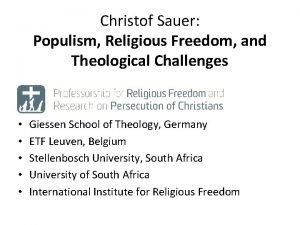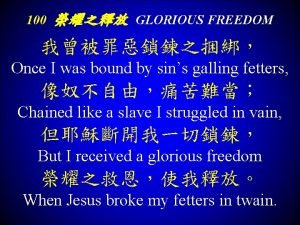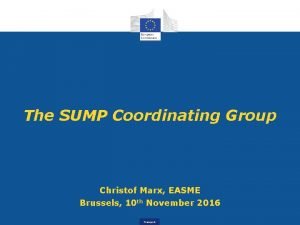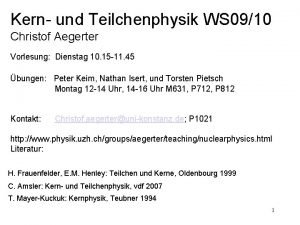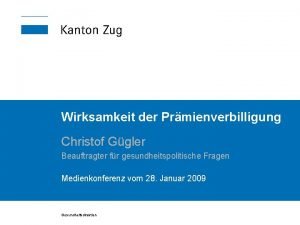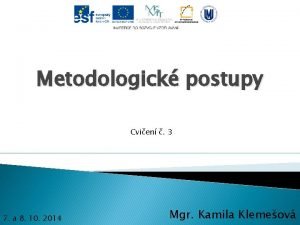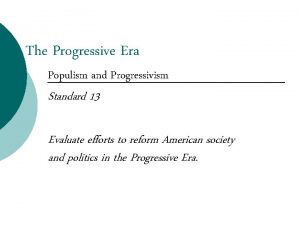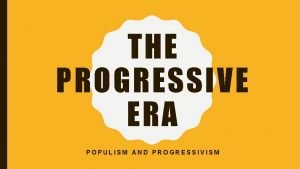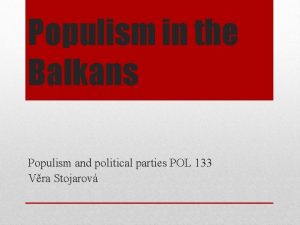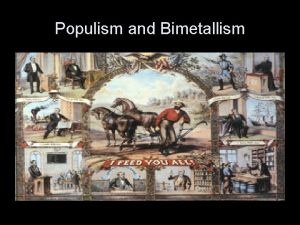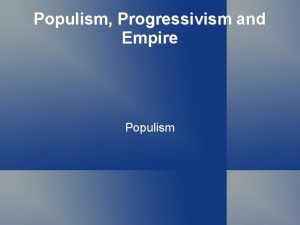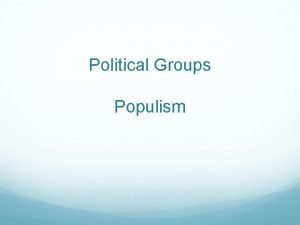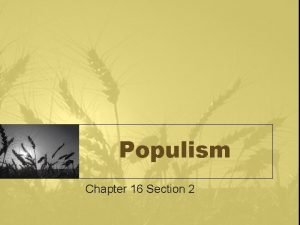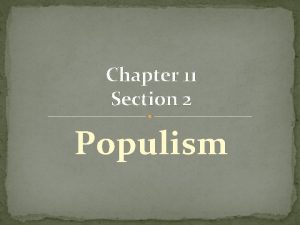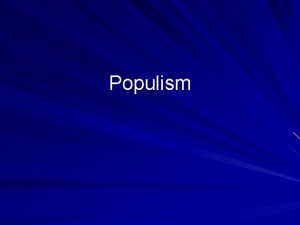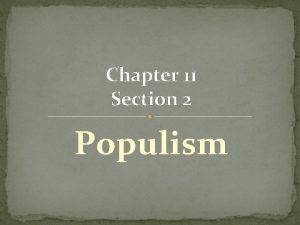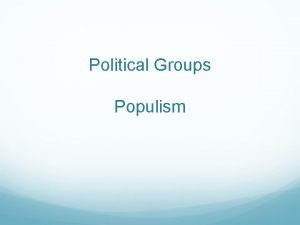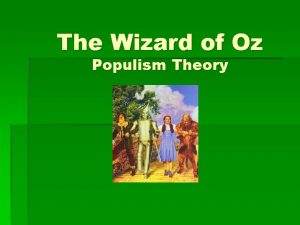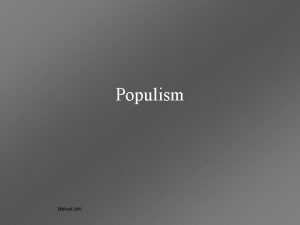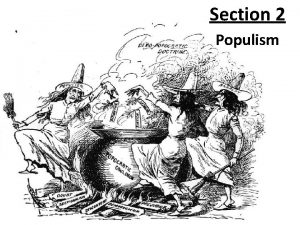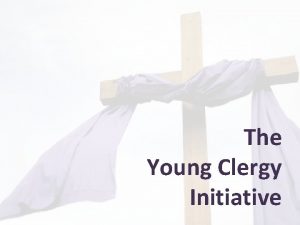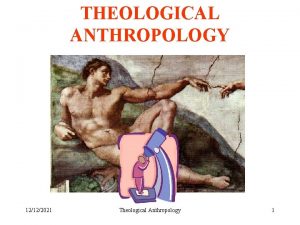Christof Sauer Populism Religious Freedom and Theological Challenges






















- Slides: 22

Christof Sauer: Populism, Religious Freedom, and Theological Challenges • • • Giessen School of Theology, Germany ETF Leuven, Belgium Stellenbosch University, South Africa University of South Africa International Institute for Religious Freedom

Outline 1. 2. 3. 4. 5. 6. Populism: Terminology and definitions Populism: Background Populists hijacking religion Christian populism Religious freedom and populism Theological challenges

Populism: Definitions Daniele Albertazzi and Duncan Mc. Donnell “a thin-centered ideology which pits a virtuous and homogeneous people against a set of elites and dangerous ‘others’ who are together depicted as depriving (or attempting to deprive) the sovereign people of their rights, values, prosperity, identity and voice. ”

Populism: Terminology • A loaded term: used to denigrate others • An unprecise term: right wing and left wing • Signifies a broad range of phenomena in different contexts • Alternative terms: • Exclusivist populism: describes the people in an exclusivist way; claims to be the exclusive voice of the whole people • Nativist ideologies: put the indigenous above all others

Populism: Distinctions • Style of politics (trying to get the favor of the masses) • Type of political party (narrowly defined: four elements simultaneously combined, and exclusivist reference to the people) Tim Spier, Professor of Political Science, Siegen, Germany

Populist party: Scholarly Definition (Tim Spier) 1. People suggested as a unity; denying opposing interests in society 2. Identity politics: creating identity through an imaginary community; community by exclusion via hostile stereotypes (against elites and minorities) 3. Leader: Charismatic figure using a standard arsenal of means for gaining attentions, 4. Organisation: self-description as movement not party; often very hierarchical decision processes

Populist party: Scholarly Definition (Tim Spier) Combination “thin centered ideology” + any other ideology e. g. Characteristics of right wing populism: • Radical nationalism • Strong xenophobia • Authoritarianism • Possible other elements

Populism in action In government • • Hungary: Fidesz Poland: Law and Justice USA: Trumpism Mainly in former soviet block countries (Halik) Party in opposition • Germany: Af. D Defunct party Movement • UK: Brexit

Populism: Analysis of Background (Zulehner) Problems • Societal changes lead to new complexity (Unübersichtlichkeit) • Require increased coping skills • Growing gap between challenges and corresponding competences Resolution • Borrowing identity • Following charismatic leaders • Offering simplistic solutions for complex problems

Populism: Analysis of Background (Zulehner) Diagnosis: Europe is united in a culture of fear since 2008 (Heinz Bude) Two ways of responding to fears of people • Politics of fear: multiplies fears • Politics of confidence: reduces/overcomes fear

Problems Triggering Populism (Walter Lesch) • Irritation by failure of political elite and crisis of political institutions • Evolution of parallel societies and identitarian communities • Paralysis by excesses of violence, hatred, racism, authoritarianism • Difficulties in dealing with the plurality of cultures, religions, lifestyles …

Attitudes to religion: global picture (Olav Fykse Tveit) • Syncretism: Mixing religions • Freedom from religion: promoting societies and life orientation free of religion • Promoting exclusive identity, by – Politicizing religion – Nationalizing religion – Using religion as basis for violence

Religion and Populism: Distinctions 1. Populists not using religion (but national tradition, liberalism, secularism) 1. Populists hijacking religion 2. Religious populists

Populists hijacking Christianity 1. Drawing on Christian language, imagery and (superficially) Christian concerns. 2. Varied according to context 3. Appeal to Europe’s Christian heritage, Christian roots, values, principles, people, identity.

Populists hijacking Christianity 1. Consider Christianity not as a faith but as an identity 2. Use of Christianity is alsmost always exclusionary 3. Favor material and geographic manifestations of the faith over and above personal, spiritual content 4. The cross is largely emptied of its content. Becomes a comfortable symbol of national cultural identity.

Christian populists E. g. Hungary • Say, the do not want to grant asylum to Muslim refugees (In fact don‘t want any refugees) • Say, they only want to accept Christians (In fact accept very few Christians and send some back)

Religious Freedom and populism • Hostility to minorities • Dividing religious freedom • Tendency to control religion

Theological issues in responding to populism • • Identity Church – State relations Role of public theology Strengthening values of democratic discourse Truth Human dignity Service

Questions for discussion • Nationalism vs healthy patriotism • Truth: practices of opinion shaping by lies • Which societal challenges do your recognize in your context? • Red line: Where must churches draw a red line in engaging with populist politicians in the dispute on political issues.

Free @ www. iirf. eu

Bibliography Browne, Matt, Dalibor Rohac, and Carolyn Kenney: Europe’s Populist Challenge: Origins, Supporters, and Responses. Center for American Progress/ American Enterprise Institute for Public Policy Research. May 2018, 24 pp. www. americanprogress. org CEC, Public Issues Committee Statements, 5. June 2018 (section on populism) Cremer, Tobias: Defenders of the faith: why right wing populists are embracing religion. 30 May 2018. New Statesman. Halik, Tomas: Statement. . . im Pressegespräch zum Studientag ”Verständnisgrundlagen des Dialogs mit den Kirchen in Mittel- und Osteuropa”, Pressemitteilung der Deutschen Bischofskonferenz. 21. 02. 2018 Hoelzl, Michael: Die normative Kraft des Kontrafaktischen: Populistische Positionen zwischen Ideal und Lüge. In: Walter Lesch (ed. ): Christentum und Populismus. Freiburg: Herder, 2017, 187 -199. Lesch, Walter: Perspektiven der Auseinandersetzung mit dem Populism in Religion, Politik, und Gesellschaft. In: Walter Lesch (ed. ): Christentum und Populismus. Freiburg: Herder, 2017, 200 -208. Marzouki, Naida and Duncan Mc. Donnell and Olivier Roy (eds. ): Saving the people. How populists hijack religion. Hurst 2016 Reclaiming Jesus: A confession of faith in a time of crisis. USA. Reclaiming. Jesus. org. Rising Populism Threatens International Religious Freedom. www. sharedjustice. org 2017. Spencer, Nick: The rise of Christian populism. 6 October 2017. First published in: The Bible in Transmission. www. biblesociety. org. uk Spier, Thomas: Was versteht man unter „Populismus“? Bundeszentrale für Politische Bildung, 25. 9. 2014. Thielmann, Wolfgang (ed. ): Alternative für Christen? Die Af. D und ihr gespaltenes Verhältnis zur Religion. Neukirchener Verlag 2017. Tveit, Olav Fykse: Accountability in global leadership. Speech at World Economic Forum, -Davos, January 2017. www. WCC-COE. org Weidinger, Bernhard: Equal before God, and God Alone: Cultural Fundamentalism, (Anti-) Egalitarianism, and Christian Rhetoric in Nativist Discourse from Austria and the United States. Journal of Austrian-American History, Vol. 1, No. 1 (2017), 40 -68. Woelki, Kardinal Rainer Maria: Entschieden für Menschenwürde und Menschenrechte: Zur kirchlichen Haltung gegen Rechtspopulismus. In: Af. D, Pegida und Co. : Angriff auf die Religion? Edited by Stefan Orth and Volker Resing, Freiburg: Herder 2017, 9 -35. Zulehner, Paul M. : Zum Rechtspopulismus in Europa: Gründe und Gegenstrategien. In: Af. D, Pegida und Co. : Angriff auf die Religion? Edited by Stefan Orth and Volker Resing, Freiburg: Herder 2017, 181 -190.

Heiner Bielefeldt: Freedom of Religions of Belief, Bonn 2017. (UN Special Rapporteur for Freedom or religion or belief) Online: www. iirf. eu
 Christof sauer
Christof sauer Positive freedom negative freedom
Positive freedom negative freedom Glorious freedom wonderful freedom
Glorious freedom wonderful freedom Christof marx
Christof marx Christof schoser
Christof schoser Christof aegerter
Christof aegerter Ggler
Ggler The cardinal and theological virtues
The cardinal and theological virtues Chano sauer
Chano sauer Sauer compressors
Sauer compressors Carl sauer
Carl sauer Carl sauer vegetative hearth theory
Carl sauer vegetative hearth theory Carl sauer vegetative hearth theory
Carl sauer vegetative hearth theory Ben sauer imperial
Ben sauer imperial Thomas samuel kuhn
Thomas samuel kuhn Telle sauer med adhd
Telle sauer med adhd Foreshadowing in the scarlet letter
Foreshadowing in the scarlet letter Verseifungszahl kokosfett
Verseifungszahl kokosfett Tony sauer cues
Tony sauer cues The wizard of oz
The wizard of oz Populism and progressivism
Populism and progressivism Populism and progressivism
Populism and progressivism Populism and progressivism
Populism and progressivism
